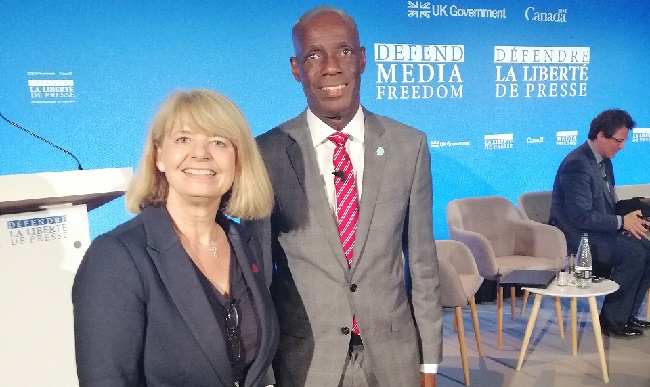UK praises Liberia’s press freedom law

Ministers Baldwin and Nagbe at the Global Media Conference in London
The minister for development at the UK’s Department for International Development (DFID) has praised Liberia for passing a law decriminalizing free speech and expression.
In the opening address at a panel on “Press Freedom, Development and Democracy in Africa” as part of the Global Media Conference held recently in London, Harriett Baldwin reminded the delegates about the significance of the gains made by Liberia with the passage of the ‘KAK Press Freedom legislation’
“Through my honourable friend, Minister Eugene Lenn Nagbe, can I also salute Liberia, on passing their press freedom legislation. It’s a milestone truly to be celebrated. It decriminalized libel against the president and amended the law on sedition. I think we should all give them a warm round of applause,” she said.
Baldwin also hailed the African Union for leading efforts on the continent regarding a free society.
She noted that the presence of the UK Foreign Secretary at the 2019 World Press Freedom Day in Addis Ababa, Ethiopia further testifies to the UK support for media freedom on the continent and worldwide.
“We know that free media enables people to learn about their rights and hold governments to account. This is vital for developing free and open societies,” the minister intimated
She added that when people can engage with the decisions that affect them, they can prove the effectiveness of their government. “Such environment makes business better, improves civil society and eventually, they take charge of their development.”
Baldwin bemoaned the crisis state of media freedom around the world.
She recalled that in many developing countries, the size and strength of the independent media is increasingly constrained.
As a co-convener of the two-day Global Media Freedom Conference, the UK has also rolled out series of critical interventions in advancing press freedom, professional journalism and media freedom mostly in Africa.
Aware of the increasing wave of disinformation, The UK government is leading with a £15m support to protect independent media in several countries in Africa.
Additionally, UK Foreign Secretary Jeremy Hunt has announced a new Chevening Africa Media Freedom Fellowship.
The new program will assemble 60 exceptional African journalists to develop their craft at some of UK’s best news corporation over the next five years.
A crucial outcome of the two-day media conference is also a global media defence fund,a partnership between UNESCO and the UK Government.
“Critical partnership such as these are essential to tackle deep rooted challenges,” said Baldwin.
Serving on the panel of policy makers, practitioners and governments from Africa, Liberian Information Minister Lenn Eugene Nagbe informed the forum about efforts to ensure that claims against media houses for ethical breaches do not become so excessive to the extent that they limit media freedom and free speech.
Minister Nagbe argued that such claims ought not to overwhelm the financial base of media houses and ultimately erode the progress made from decriminalizing speech, and other media reforms.
Towards this end, Nagbe noted that the Liberian government is working with the Press Union of Liberia (PUL) to seek a review of Liberia’s civil libel regime with the aim to strengthen media freedom in the country.
“A fundamental requirement for a free society is that we must recognize that media freedom is not a gift to journalists – but a requirement – for society to grow, to thrive and be democratic,” he asserted.
The Global Conference for Media Freedom was organised by the UK and Canadian governments.
It brought together governments, multilateral agencies, civil society and journalists.
The event is part of an international campaign to shine a spotlight on media freedom everywhere, increasing the costs to those violating it while improving the safety of journalists and media workers and their ability to work without interference and easing restrictions on freedom of media and expression.
Albert Jaja

